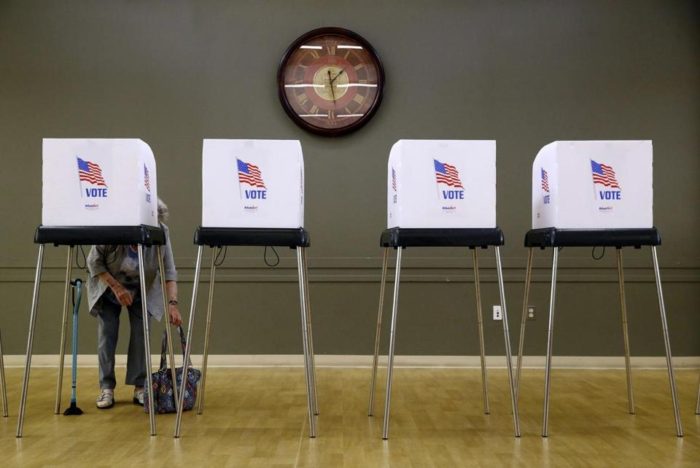

Democrats are worrying about winning enough races across America to wrest Congress from the Trumpified GOP. But their worries should start within their own ranks.
Faced with a GOP unified behind Trump, the Democratic Party should support candidates it deems most electable in a given state or district. But too often Democrats have become mired in doctrinal warfare. Financially enfeebled, the party finds itself coping with better-funded interest groups and individuals serving agendas of their own. Organizations like Emily’s List, however admirable, support candidates in Democratic primaries based less on electability than identity or fidelity to an issue. The billionaire would-be president Tom Steyer blankets the airwaves with self-promoting advocacy for impeachment — electoral suicide for Democrats in many areas of the country. While far more judicious, Michael Bloomberg is spending millions on individual races based on his personal criteria. And groups aligned with Bernie Sanders are attempting to transform the party’s ideology.
Collectively, these outside forces frequently compete with the party by backing their own primary candidates. In any given race, such candidates may have real merit. But only the Democratic National Committee and its affiliates are attempting to build a national party that can retake Congress in a disparate and divided America.
Given Trump, 2018 is an exceedingly poor time for fratricide over litmus tests of progressive purity like single-payer health care, abolishing ICE, or guaranteed federal jobs — especially in districts where the party must appeal to moderates and independents to win. As a Democratic operative notes, “You can’t say your ideology wins if you lose.”
In primaries to date, the overall record of Sanders-backed candidates has been distinctly mixed, yielding more losses than wins. In true-blue districts, where mainstream appeal doesn’t matter in November, an ardent and appealing progressive like Alexandria Ocasio-Cortez can defeat an incumbent congressman and thrive. But in the 50 or so competitive races that will determine which party controls the House, the mainstream candidates will count for more.
Take California. There are seven districts where the Democrats might flip crucial seats now held by Republicans. Eager candidates flooded the Democratic primaries: In California’s open primary system, this created the danger that the top two Republican candidates would run against each other in November.
Mercifully, this did not happen. And in all but one race, moderate Democrats better suited to the district prevailed. Similarly, in three New Jersey congressional districts, moderate Democrats beat three Sanders-backed candidates, enhancing the prospect of unseating Republicans.
In the Senate, which decides Supreme Court nominations, three centrist candidates in states that only moderate Democrats can win – Jacky Rosen in Nevada, Kyrsten Sinema in Arizona, and Phil Bredesen in Kentucky – represent the party’s best chance of picking up seats. Clearly, there are critical locales where the Democrats need such nominees. The question becomes whether the Sanders crusade is less about curbing Trump than about driving the party leftward — and whether Sanders loyalists will turn out for moderates in November.
Certainly, Sanders-style progressives are entitled to fight for a party that more fully embraces their views. That’s what democracy is about. Their energy can help reanimate the party and its principles; the small donors Sanders rallied in 2016 provide testament to that. But a Democratic Party with a clear agenda aimed at making our country a better, fairer, and more inclusive place for all Americans need not be philosophically rigid.
Most Democrats across the spectrum are in broad agreement about very important needs: Fighting wage stagnation and income inequality. Providing relief for working parents. Advancing opportunity for their kids — early childhood education, vocational training, affordable college, student debt relief, protection from predatory lenders and bogus for-profit colleges. Insuring universal health care. Investing in infrastructure. Encouraging economic development in depressed areas. Retraining workers displaced by economic change.
Nor are Democrats of varied viewpoints confused about the essence of what America should be. They deplore separating refugee children from parents who are fleeing misery and murder. They want a fair and compassionate immigration policy, equal rights for women and minorities, a justice system free of bias — and in which no president is above the law.
Any sane Democrat of whatever stripe must acknowledge that this shared vision of America contravenes Trump’s divisive and plutocratic agenda. And that nothing is more important than curbing his frightening accretion of autocratic means for malign ends. The indispensable prerequisite is winning control of Congress in 2018. That requires a unified and broad-based Democratic Party — not one riven by ideological rapture.
Richard North Patterson’s column appears regularly in the Globe. Follow him on Twitter @RicPatterson.
more recommended stories
 Fentanyl Seizures at Border Continue to Spike, Making San Diego a National Epicenter for Fentanyl Trafficking
Fentanyl Seizures at Border Continue to Spike, Making San Diego a National Epicenter for Fentanyl TraffickingFentanyl Seizures at Border Continue to.
 Utah Man Sentenced for Hate Crime Attack of Three Men
Utah Man Sentenced for Hate Crime Attack of Three MenTuesday, August 8, 2023 A.
 Green Energy Company Biden Hosted At White House Files For Bankruptcy
Green Energy Company Biden Hosted At White House Files For BankruptcyAug 7 (Reuters) – Electric-vehicle parts.
 Former ABC News Reporter Who “Debunked” Pizzagate Pleads Guilty of Possessing Child pδrn
Former ABC News Reporter Who “Debunked” Pizzagate Pleads Guilty of Possessing Child pδrnFriday, July 21, 2023 A former.
 Six Harvard Medical School and an Arkansas mortuary Charged With Trafficking In Stolen Human Remains
Six Harvard Medical School and an Arkansas mortuary Charged With Trafficking In Stolen Human RemainsSCRANTON – The United States.
 Over 300 People Facing Federal Charges For Crimes Committed During Nationwide Demonstrations
Over 300 People Facing Federal Charges For Crimes Committed During Nationwide DemonstrationsThe Department of Justice announced that.
